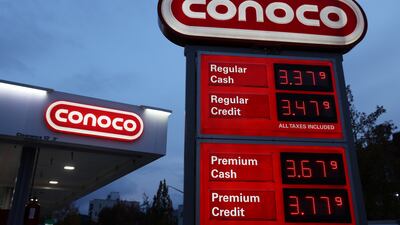The US oil and gas industry is continuing its wave of mega mergers, showing that companies in the sector are seeking to diversify their operation locations.
ConocoPhillips became the latest oil company to get in on the trend after it agreed to acquire Marathon Oil in an all-stock deal valued at $17 billion, the companies said on Wednesday. The deal has an enterprise value of $22.5 billion, with ConocoPhillips taking on $5.4 billion of net debt.
The companies said the acquisition would add more than two billion barrels of resource to Conoco's portfolio.
Should the deal go through, Conoco would take over operations in the Bakken Basin in North Dakota, as well as the Eagle Ford in Texas and the Permian Basin in New Mexico.
“The combined firm will instantly become a diversified powerhouse, with assets across several core tight oil regions of the Lower 48,” Rystad Energy wrote in a note referring to the lower 48 US states.
Rystad Energy added the deal shows a drive by Conoco to become a leader in shale across other regions apart from the Permian Basin.
Conoco also holds interests in Qatar, Libya and elsewhere.
The Permian Basin has become a point of particular focus for crude oil production in the US, which has become the global leader in production. The US hit a record 12.9 million barrels per day last year, a 9 per cent increase from 2022, the Energy Information Administration said.
Crude oil production exited the Permian Basin at a record more than 6 million barrels per day last year, East Daley Analytics reported, after accounting for 46 per cent of US oil production in 2022.
Matthew Bey, senior global analyst at Rane, does not believe there is a direct link between the mega deals and the US becoming the global leader in oil and gas production.
“We're in an era where the innovation and the need to have independent companies that are small start-ups, that are risk-taking companies, really isn't there any more. It's now a mature investment,” he told The National.
A marked shift in deal-making in the US M&A market
Rystad Energy said the deal marks a shift in “Shale 4.0" deal-making in the merger and acquisition market, where companies outside of the Permian Basin become primary targets for acquisition.
The agreement is the latest in a series of large acquisitions in the US oil and gas industry in recent years. The sector spent $234 billion on mergers and acquisitions in 2023 alone, according to the Energy Information Administration
“Now we are starting to see a lot of larger players trying to gain as many assets as they can, in order to take advantage of economies of scale,” Mr Bey said.
On Tuesday, Hess investors approved the company's $54 billion merger with Chevron. The announcement came weeks after the US Federal Trade Commission said it would not block Exxon Mobil's $60 billion acquisition of Pioneer.
“I think that all of them are trying to grow bigger in order to at least increase their own market share, increase their own size, increase their own revenue. But I'm not sure how much of it is solely about the idea of trying to outman one another,” Mr Bey said.
“The oil and gas industry is one of those industries where there is competition between these majors, but at the same time, there's also plenty of … money to be made all around.”
Conoco's deal is still likely to face some scrutiny from the FTC, which has taken a more aggressive role in clamping down on anticompetitive behaviour.
The regulator said it only approved of Exxon's acquisition of Pioneer on condition that a former executive accused of trying to collude with Opec not serve on the company's board.
A group of senators led by Majority Leader Chuck Schumer recently requested the Justice Department to investigate the industry after the FTC claims about former Pioneer chief executive Scott Sheffield.
Mr Sheffield denies that he tried to collude with Opec.
“These reports are alarming and lend credence to the fear that corporate avarice is keeping prices artificially high,” the senators wrote in a letter obtained by Politico.
“This is also a national security concern: this alleged collusion with Opec may have served to enrich countries like Iran and Russia that are actively seeking to undermine the United States and our allies.”


